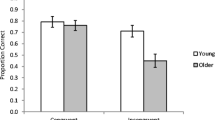Abstract
The ability to benefit from various kinds of cognitive support in episodic memory was studied in a population-based sample of healthy adults aged 35–80 years (N = 1,000). The participants studied pictures of faces and names of 10-year-old children with instructions to remember the faces and the surnames. After study, an implicit name stem-completion test was administered, followed by face- and name-recognition tests. There was a negative age effect across all task variables. Across age, recognition was higher for faces than for names. An age-invariant positive effect of intention to learn was observed. Also, name completion and recognition performance showed a positive relationship across the adult life span. Overall, the results are in agreement with the views that (a) age-related episodic memory deficits are highly generalizable and (b) effects of cognitive support on memory are typically of equal size across the adult life span.
Similar content being viewed by others
References
Allaire, J. C., & Marsiske, M. (1999). Everyday cognition: Age and intellectual ability correlates. Psychology and Aging, 14, 627–644.
Bäckman, L. (1991). Recognition memory across the adult life span: The role of prior knowledge. Memory and Cognition, 19, 63–71.
Bäckman, L., Ginovart, N., Dixon, R. A., Robins Wahlin, T.-B., Wahlin, å., Halldin, C., et al. (2000). Age-related cognitive deficits mediated by changes in the striatal dopamine system. American Journal of Psychiatry, 157, 635–637.
Bäckman, L., & Larsson, M. (1992). Recall of organizable words and objects across the adult life span: Influences of instructions, retention interval, and retrieval cues. Journal of Gerontology: Psychological Sciences, 4, 273–278.
Bäckman, L., Mäntylä, T., & Herlitz, A. (1990). The optimization of episodic remembering in old age. In P. B. Baltes & M. M. Baltes (Eds.), Successful aging: Perspectives from the behavioral sciences (pp. 118–163). New York: Cambridge University Press.
Bäckman, L., Small, B. J., & Larsson, M. (2000). Memory. In J. G. Evans, T. F. Williams, B. L. Beattie, J.-P. Michel, & G. K. Wilcock (Eds.), Oxford textbook of geriatric medicine (Vol. 2, pp. 906–916). Oxford: Oxford University Press.
Börjesson, A., Karlsson, T., Adolfsson, R., Rönnlund, M., & Nilsson, L.-G. (1999). Linopirdine (Dup996) cholinergic treatment for older adults using successive and nonsuccessive tests. Neuropsychobiology, 40, 78–85.
Bowers, J. S., & Schacter, D. L. (1990). Implicit memory and test awareness. Journal of Experimental Psychology: Learning, Memory and Cognition, 16, 404–416.
Cohen, G. (1990). Why is it difficult to put names to faces? British Journal of Psychology, 81, 287–297.
Craik, F. I. M., & Jennings, J. M. (1992). Human memory. In F. I. M. Craik & T. A. Salthouse (Eds.), The handbook of aging and cognition (pp. 51–110). Hillsdale, NJ: Erlbaum.
Craik, F. I. M., & McDowd, J. M. (1987). Age differences in recall and recognition. Journal of Experimental Psychology: Learning, Memory, and Cognition, 13, 474–479.
Grady, C. L., McIntosh, A. R., Rajah, N. M., & Craik, F. I. M. (1998). Neural correlates of the episodic emcoding of pictures and words. Proceedings of the National Academy of Sciences, USA, 95, 2703–2708.
Habib, R., & Nyberg, L. (1997). Incidental retrieval processes influence explicit test performance with data-limited cues. Psychonomic Bulletin and Review, 4, 130–133.
Herlitz, A., Nilsson, L.-G., & Bäckman, L. (1997). Gender differences in episodic memory. Memory and Cognition, 25, 801–811.
Hyde, T. S., & Jenkins, J. J. (1969). The differential effects on incidental tasks on the organization of recall of a list of highly associated words. Journal of Experimental Psychology, 82, 472–481.
Jacoby, L. L. (1991). A process dissociation framework: Separating automatic from intentional uses of memory. Journal of Memory and Language, 30, 513–541.
Jones, S. J., & Rabbitt, P. M. A. (1994). Effects of age on the ability to remember common and rare proper names. The Quarterly Journal of Experimental Psychology, 47A, 1001–1014.
Kausler, D. H. (1991). Experimental psychology, cognition, and human aging (2nd ed.). New York: Springer-Verlag.
Light, L. L., Singh, A., & Capps, J. C. (1986). Dissociation of memory and awareness in young and old adults. Journal of Clinical and Experimental Neuropsychology, 8, 62–74.
Nelson, T. O., Metzler, J., & Reed, D. A. (1974). Role of details in the long-term recognition of pictures and verbal descriptions. Journal of Experimental Psychology, 102, 184–186.
Nilsson, L.-G., Bäckman, L., Erngrund, K., Nyberg, L., Adolfsson, R., Bucht, G., et al. (1997). The Betula Prospective Cohort Study: Memory, health, and aging. Aging, Neuropsychology, and Cognition, 4, 1–32.
Nyberg, L., Bäckman, L., Erngrund, K., Olofsson, U., & Nilsson, L.-G. (1996). Age differences in episodic memory, semantic memory, and priming: Relationships to demographic, intellectual, and biological factors. Journal of Gerontology: Psychological Sciences, 51B, P234-P240.
Nyberg, L., Nilsson, L.-G., Olofsson, U., & Bäckman, L. (1997). Effects of division of attention during encoding and retrieval on age differences in episodic memory. Experimental Aging Research, 23, 137–143.
Nyberg, L., Olofsson, U., Gardiner, J. M., & Nilsson, L.-G. (1997). Assessment of retrieval strategy in incidental, intentional, and inclusion tests with word-fragment cues. Psychological Research, 59, 231–239.
Paivio, A., & Csapo, K. (1973). Picture superiority in free recall: Imagery or dual coding? Cognitive Psychology, 5, 175–200.
Puglisi, J. T., & Park, D. C. (1987). Perceptual elaboration and memory in older adults. Journal of Gerontology, 42, 160–162.
Rabinowitz, J. C. (1989). Judgments of origin and generation effects: Comparisons between young and elderly adults. Psychology and Aging, 4, 259–268.
Roediger, H. L., III, & McDermott, K. B. (1993). Implicit memory in normal human participants. In H. Spinnler & F. Boller (Eds.), Handbook of neuropsychology (Vol 7, pp. 63–121). Amsterdam: Elsevier.
Russo, R., & Parkin, A. J. (1993). Age differences in implicit memory: More apparent than real. Memory and Cognition, 21, 73–80.
Salthouse, T. A. (1991a). Theoretical perspectives on cognitive aging. Hillsdale, NJ: Erlbaum.
Salthouse, T. A. (1991b). Independence of age-related influences on cognitive abilities across the life span. Developmental Psychology, 34, 851–864.
Shimamura, A. P. (1985). Problems with the finding of stochastic independence as evidence for multiple memory systems. Bulletin of the Psychonomic Society, 23, 506–508.
Simic, G., Kostovic, I., Winblad, B., & Bogdanovich, N. (1997). Volume and the number of neurons of the human hippocampal formation in normal aging and Alzheimer's disease. Journal of Comparative Neurology, 379, 482–494
Spoehr, K. T., & Lehmkule, S. W. (1982). Visual information processing. San Francisco: Freeman.
Tulving, E., Schacter, D. L., & Stark, H. A. (1982). Priming effects in word-fragment completion are independent of recognition memory. Journal of Experimental Psychology: Learning, Memory, and Cognition, 4, 336–342
Author information
Authors and Affiliations
Rights and permissions
About this article
Cite this article
Larsson, M., Nyberg, L., Bäckman, L. et al. Effects on Episodic Memory of Stimulus Richness, Intention to Learn, and Extra-Study Repetition: Similar Profiles Across the Adult Life Span. Journal of Adult Development 10, 67–73 (2003). https://doi.org/10.1023/A:1022497230520
Issue Date:
DOI: https://doi.org/10.1023/A:1022497230520




